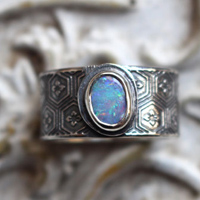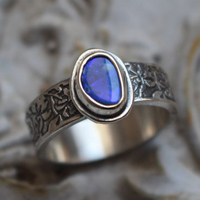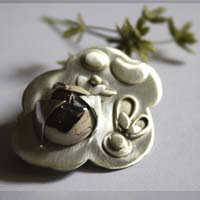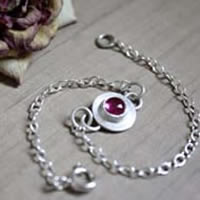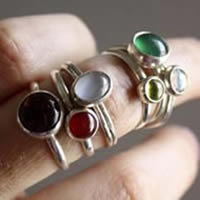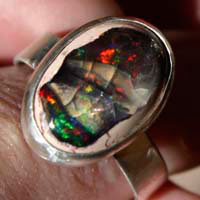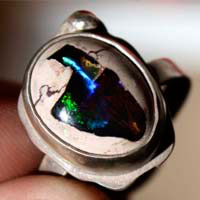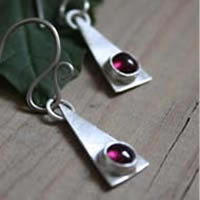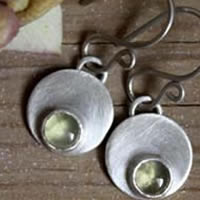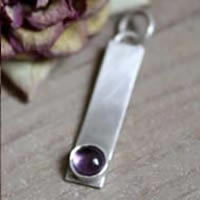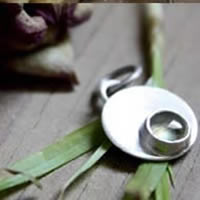- Jewelry
- Inspiration
- Good Deals
- Paintings
- About
- Contact
JEWELRY
- Anklet
- Bracelets
- Brooches
- Cufflinks
- Earrings
- Pendants & Necklaces
- Rings
- Draw your jewelry
- GOOD DEALS
- How to clean your jewel
- Metal we used
INSPIRATION
Opal: history, healing properties and lithotherapy

Opal properties

The name "opal" originates from the Sanskrit word Upala, meaning "gem" or "precious stone." This ancient term influenced the Latin Opalus and the Greek Opallios, both of which allude to "the change of color," a reference to the stone’s remarkable ability to reveal light play and multicolored reflections.
Long regarded as a mineral, opal was reclassified in 2007 to reflect its unique and hybrid nature. It is primarily composed of hydrated amorphous silica, enriched with cristobalite and tridymite, two polymorphs of silica. Its water content, typically ranging from 3% to 9%, can occasionally reach 20% in exceptional cases, directly influencing its translucency and brilliance.
Opal is distinguished by its disordered microscopic structure, in contrast to the orderly crystals of traditional minerals. This distinctive feature gives opal its unique internal texture, which contributes to its remarkable optical properties. While its chemical composition shares similarities with minerals such as quartz, it is this amorphous, hydrated structure that defines opal’s singularity.
Opals are categorized into two main types:
- Common opal, which lacks color play and exhibits uniform, opaque hues ranging from white to brown.
- Precious opal, celebrated for its transparency and iridescent reflections, offering a mesmerizing display of shifting colors.
These color variations, known as play-of-color or "opalescence," result from the unique arrangement of microscopic spheres of cristobalite or tridymite within the silica matrix. These spheres form a network that diffracts light, producing an intense and ever-changing array of colors depending on the angle of observation and the light source.
Opal has a relatively low hardness on the Mohs scale, typically rated between 5.5 and 6.5. This makes it more susceptible to scratches and impacts compared to gemstones like quartz (7) or diamond (10). Additionally, its water content influences its fragility; exposure to temperature fluctuations or excessively dry environments can lead to cracking, a phenomenon known as "crazing."
Despite this relative fragility, opal is highly prized for its incomparable beauty and its ability to capture light in a unique way. However, its care requires particular precautions, such as avoiding thermal shocks and contact with harsh chemicals.
Mines: USA, Mexico, New Zealand, Czech Republic and Australia.
History, legends and beliefs about opals
In Australia, the Aboriginal people poetically referred to opal as the "rainbow serpent," reflecting the stone’s profound role in their cosmology. According to an ancient legend, the Creator God captured the shimmering colors of the rainbow and fused them to give birth to opal, seen as a link between the sky and the earth. Another version of the myth describes the deity traveling across the heavens on a rainbow path, leaving behind luminous traces that crystallized into opals. These tales highlight the Aboriginal people’s fascination with the stone’s multicolored reflections, often associated with spirituality and a connection to the unseen world.
In Mesopotamia, traces of opal have been discovered at archaeological sites dating back over 4,000 years BCE. These findings suggest that the Sumerians used opal in ritual or decorative objects, showcasing their early appreciation for this precious stone.
In ancient Greece, deeply inspired by natural phenomena, opal was believed to have a divine origin. One myth recounts that the joyful tears of Zeus, shed after his victory over the Titans, transformed into opals upon touching the earth. This gemstone was thus a symbol of clairvoyance and prophecy, believed to grant its wearer wisdom and intuition. The Greeks also thought opal offered protection against illnesses and misfortune, making it a highly valued amulet.
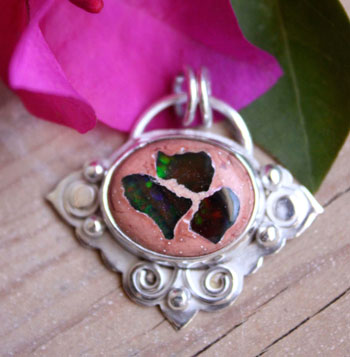
The Romans, captivated by the brilliance of opal, saw it as a symbol of hope, purity, and good fortune. The gemstone held a central place in their culture, where it was regarded as a divine gift. The famous story of Mark Antony exiling a senator who refused to sell an opal intended for Cleopatra illustrates the high regard in which this stone was held. Valued at the equivalent of 60,000 euros today, this opal was already considered an invaluable treasure.
In India, a legend tells of the Rainbow Goddess, besieged by numerous suitors, who took the drastic decision to transform herself into an opal to escape their relentless pursuit. This metamorphosis into a dazzling gemstone became a symbol of her eternal beauty and untouchable purity.
In the Arab world, a fascinating belief attributed a celestial origin to opal. It was said to contain the captured light of lightning, eternally trapped within the stone. This mystical interpretation reinforced the idea that opal was a manifestation of divine forces, symbolizing power and eternal light.
The history of opal in North America dates back nearly 10,000 years, as evidenced by archaeological finds in the Virgin Valley. Indigenous peoples valued the stone not only for its aesthetic properties but also for its spiritual significance, seeing it as a link to the spirits of nature.
In Mexico, fire opal, characterized by its fiery hues, is deeply rooted in cultural traditions. An Aztec legend tells that fire opal was born from the ashes of a dormant volcano, where the sun descended to bestow its eternal light upon the earth. This gemstone embodies warmth, passion, and vital energy, making it a sacred symbol for indigenous peoples. Even today, Mexican opals, particularly those from the Querétaro region, are among the most coveted in the world.
In Kenya, deep within a cave, remarkable archaeological discoveries have astonished the world: the oldest artifacts adorned with opals, dating back to 4,000 BCE, have been unearthed. These precious treasures, evidence of a millennia-old history, appear to have traveled from Ethiopia to dazzle ancient civilizations.
In the Middle Ages, opal was revered as "ophthalmios," or "the eye stone," due to its reputed ability to heal eye diseases and improve vision. It was also considered a protective talisman for travelers, believed to guide them and shield them from perils. Blonde women often wore opal necklaces, believing the stones preserved the luster and vitality of their hair.
During the Renaissance, opal experienced a resurgence and was celebrated by European monarchs. King Henry II of France presented an opal to his favorite, Diane de Poitiers, due to its extraordinary brilliance, which seemed to reflect her beauty. The Habsburgs, one of Europe’s most influential dynasties, regarded opal as a stone of power and influence. Emperor Ferdinand II was said to own an opal reputed to ward off illnesses and evil spirits.
However, opal’s reputation darkened in the 19th century, particularly after the publication of Sir Walter Scott’s novel Anne of Geierstein, or The Maiden of the Mist (1829). In this work, opal is associated with death and curses, leading to a dramatic decline in its popularity. In the haunting tale, Scott recounts the tragic story of Lady Hermione, falsely accused of witchcraft, who dies after her opal is touched by holy water. This literary influence demonstrates how popular beliefs can transform the perception of a gemstone, shifting from a symbol of purity and beauty to one of ill omen.
Famous opals in the history
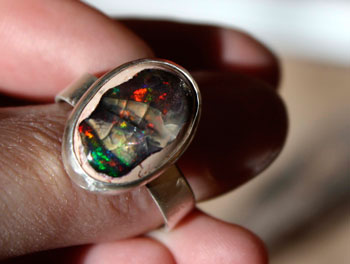
The Olympic Australis opal stands out as the largest and most valuable opal discovered to date. With an estimated value of $2,500,000 for its impressive 17,000 carats, this extraordinary gem was named in honor of the Olympic Games held in Melbourne at the time of its discovery. To this day, it remains in its raw state, untouched by cutting or polishing, which enhances its unique character and original authenticity.
The Fire Queen opal embodies perhaps the quintessence of opal in the collective imagination. Celebrated as the most iconic example of an opal’s eye, this legendary gemstone captivates with its mesmerizing play of colors, evoking the brilliance and majesty of a royal incandescent fire. It symbolizes splendor and luxury, with vivid colors ranging from red to yellow and occasionally green, creating a dazzling dance of light across the stone.
The Andamooka opal, discovered in Australia, was presented to Her Majesty Queen Elizabeth II during her first royal tour in the 1950s, a historic gesture marking admiration for this unique gem. Weighing an impressive 203 carats, this exceptional opal was set into a stunning pendant adorned with sparkling diamonds, symbolizing the perfect union of natural beauty and artisanal craftsmanship. Its reputation extends beyond Australian borders, representing the excellence of Andamooka opals.
The Burning of Troy opal is a legendary stone gifted by Napoleon to his beloved wife, Empress Joséphine de Beauharnais. Weighing 700 carats at the time, it was the largest known black opal of its era. This historic gem became famous for its mysterious and tumultuous fate: after Joséphine’s death, it disappeared, only to reappear a century later, purchased by the city of Vienna for an estimated $50,000. However, at the end of World War II, it vanished once more, disappearing into the annals of time and leaving behind a legacy of luxury and intrigue.
The Aurora Australis opal, a rare jewel among black opals, stands out for its unparalleled beauty. Weighing 180 carats, this gem embodies elegance and rarity, captivating collectors and enthusiasts worldwide. Its name echoes the enchanting glow of the aurora borealis, reflecting the magic and grace of this exceptional gemstone. The Aurora Australis opal is a true masterpiece of nature, celebrated for its subtle hues and rarity, distinguishing itself as one of the most exquisite stones in its category.
The Black Prince’s Rhyne opal, discovered in Australia in 1915, is one of the most famous and prestigious opals. Weighing 227 carats, it is now housed in the Tower of London and serves as a striking example of the brilliance of black opals. This royal opal, gifted to the British royal family, is a historical treasure admired for its beauty and rarity.
Queen Victoria owned a unique opal weighing approximately 350 carats, presented to the crown by an Indian prince during the colonial era. It was one of the queen’s favorite gemstones, embodying the timeless appeal of opal for royal and noble families worldwide.
The Lily opal, discovered in the 1920s at Coober Pedy, is a fire opal with vibrant orange and red hues reminiscent of a blooming lily. Its rarity and brilliance make it a prized piece among collectors and enthusiasts of rare gemstones.
These famous opals, each with its fascinating story, reveal the unique radiance of this precious gem and continue to captivate the imaginations of enthusiasts and collectors around the world.
Healing properties and benefits of the opal
- The opal, with its myriad legendary virtues, is renowned as a spiritual guide and a catalyst for transformations in life. This precious gemstone, associated with inner light, is regarded as a symbol of renewal and reinvention. In many ancient cultures, it was revered as a sacred stone bringing wisdom and clarity.
- Thanks to its internal structure and mesmerizing play of light, opal is believed to stimulate creativity and imagination. It fosters the emergence of new ideas, particularly in artistic domains, while helping to dispel creative blockages. This inspirational power is linked to the opal’s influence on the sacral chakra (Svadhisthana), the energy center associated with creativity, personal expression, and emotions. By activating this chakra, opal helps unleash creative energies and encourages innovation.
- Traditionally recommended for pregnant women, opal is associated with maternal protection and serene childbirth.
- It is also viewed as an emotional shield, soothing inner turmoil and balancing emotions. It reduces outbursts of anger, anxiety, and episodes of depression, thus helping to maintain a calm and stable mindset. These virtues are attributed to its effect on the heart chakra (Anahata), which governs love, compassion, and inner harmony.
- As a stone of change, opal is particularly beneficial for those navigating significant transitions, whether personal, professional, or spiritual. It provides support during these changes by bringing clarity and direction, while encouraging flexibility and adaptability. It helps individuals embrace new phases of life with confidence and serenity. This support is often attributed to opal’s effect on the higher chakras, particularly the third-eye chakra (Ajna), which is linked to intuition and clear perception of situations.
- Celebrated for its healing properties, opal is said to act holistically on the body. It is reputed to boost the immune system, combat allergies, and purify the liver, which plays a key role in detoxification.
- Opal is also believed to prevent the formation of gallstones and dissolve fibroids, contributing to overall bodily balance. In some traditions, opal is considered an energetic regulator, helping maintain harmony between the body’s various systems. It is said to work especially on the lower chakras, such as the root chakra (Muladhara), to instill a sense of security and grounding.
- Opal is also regarded as a stone of spiritual transformation, enabling individuals to reconnect with their deeper selves. It is believed to open the mind to higher consciousness, enhancing mental clarity and intuition. It is also considered beneficial for deep meditation, supporting spiritual awakening and the understanding of hidden truths. Opal notably activates the crown chakra (Sahasrara), facilitating connections with higher spiritual realms and the subtle world.
- In ancient times, opal was seen as a talisman of good fortune, particularly in the Roman Empire, where emperors wore it to attract wealth and protect their power. The ancient Greeks believed opal granted foresight and a clear vision of the future. In Eastern cultures, it was often associated with the goddess of wisdom and knowledge, symbolizing access to spiritual revelations.
 Please note that all healing properties presented for gemstones are gathered from various sources. This information is provided as a service and is not intended to treat medical conditions. It is recommended to consult a healthcare professional for serious medical issues and not to rely solely on gemstones as a treatment.
Please note that all healing properties presented for gemstones are gathered from various sources. This information is provided as a service and is not intended to treat medical conditions. It is recommended to consult a healthcare professional for serious medical issues and not to rely solely on gemstones as a treatment.
Opal jewelry samples
To learn more about litotherapy, we recommend you the following books:

